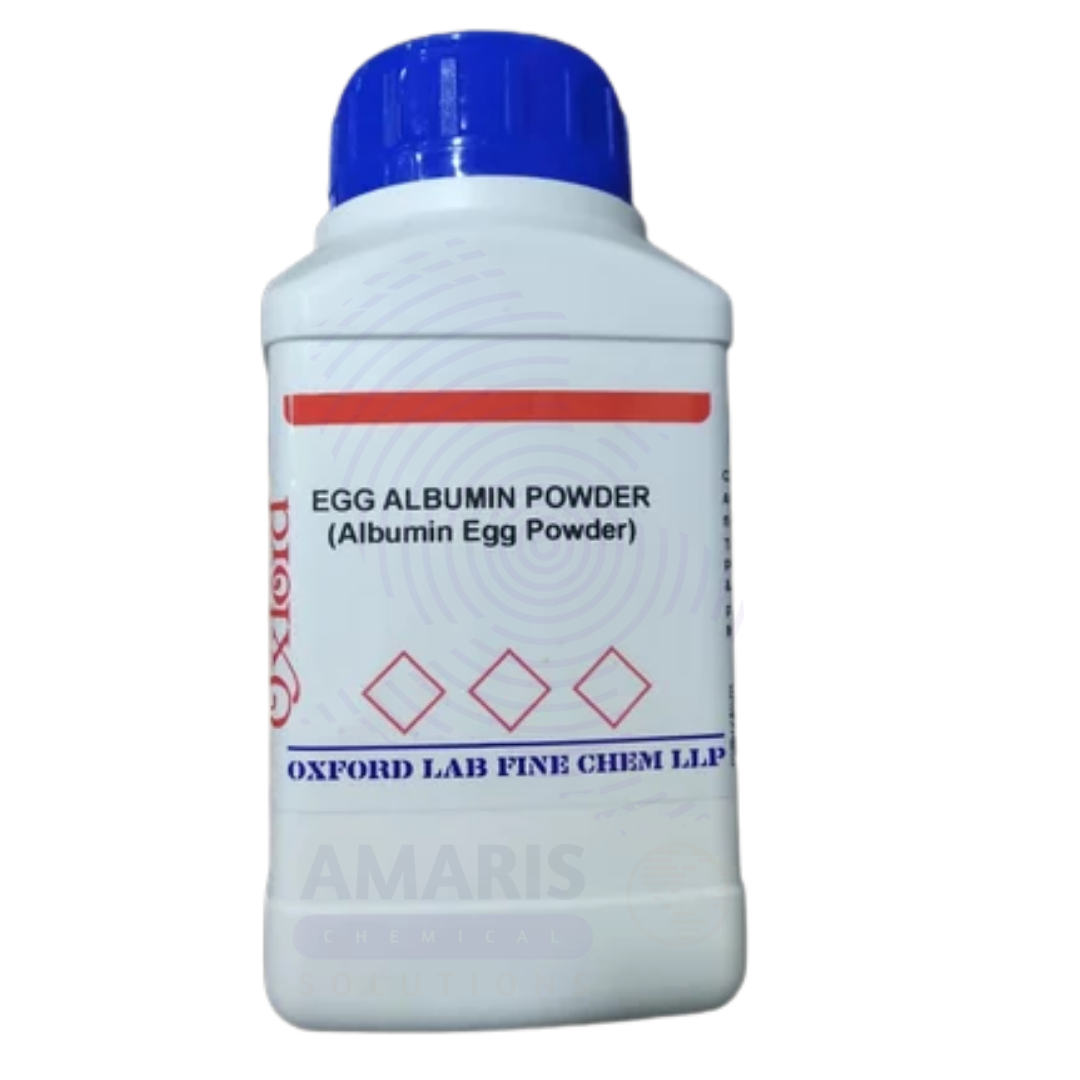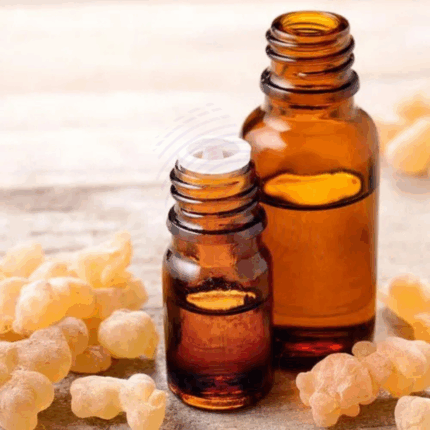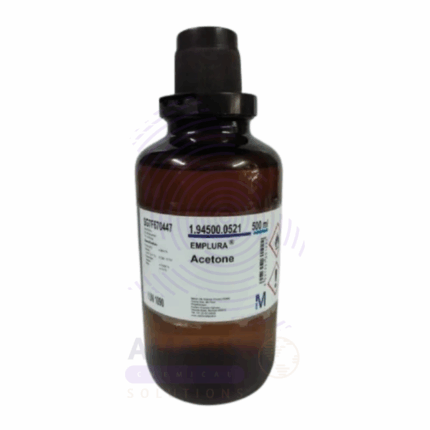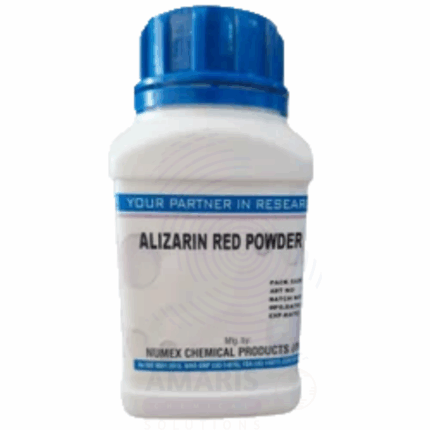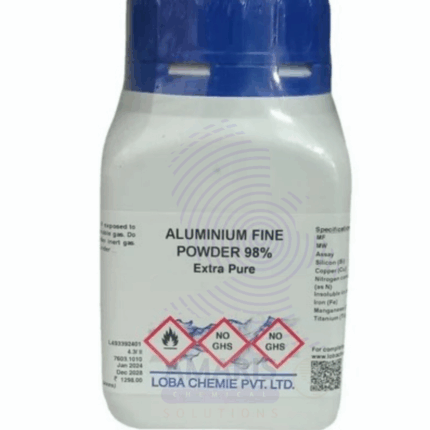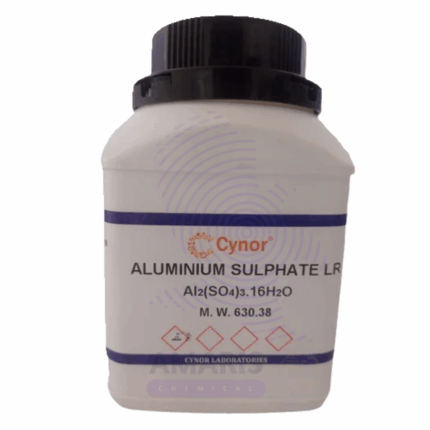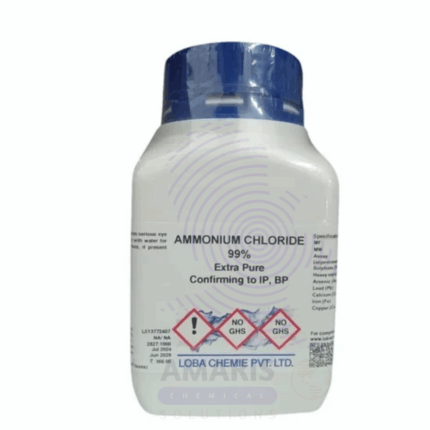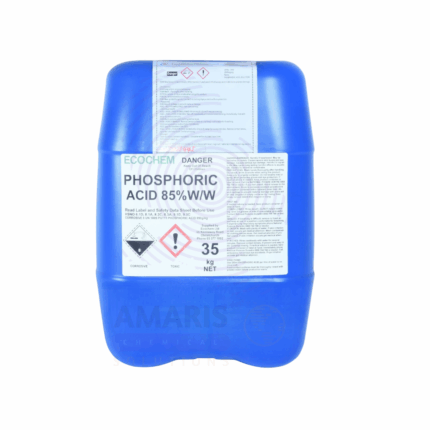“Aluminium Ammonium Sulphate Extra Pure” has been added to your cart. View cart
Back to products
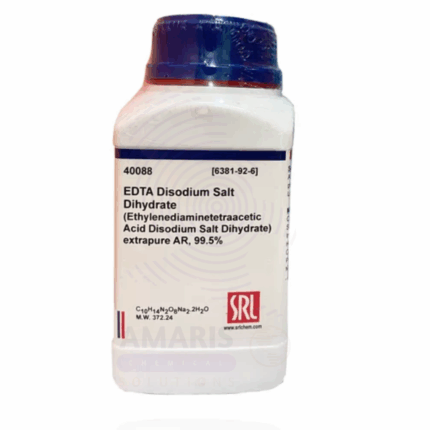

EDTA Disodium Salt Extra Pure
$ 20.00 Original price was: $ 20.00.$ 19.60Current price is: $ 19.60.
Egg Albumen Extra Pure
$ 18.00 Original price was: $ 18.00.$ 17.45Current price is: $ 17.45.
Whatsapp Order
Egg Albumen Extra Pure is a high-grade laboratory reagent derived from the white of eggs, known for its excellent protein content and binding properties. It is commonly used in biochemical experiments, protein electrophoresis, microbiological media, and as a blocking agent in immunoassays like ELISA. Its purity ensures consistent results in sensitive lab procedures involving protein interactions, enzyme activity studies, and cell culture applications.
Description
Table of Contents
Toggle
Egg Albumen Extra Pure
Primary Uses
- Protein standard in biochemical assays:
Used as a reference protein in studies like Bradford or Lowry protein assays. - Surface-blocking agent in immunoassays (e.g., ELISA):
Prevents non-specific binding by coating microtiter plates. - Model protein for studying denaturation and coagulation:
Ideal for thermal and chemical protein denaturation experiments. - Electrophoresis and chromatography applications:
Used in training and method validation for protein separation techniques.
Secondary Uses
- Film-forming agent in microbiological or pharmaceutical experiments:
Forms a protein matrix in capsule coatings or microbiological media. - Binder in histological sample preparation or slide mounting:
Helps tissue sections adhere to microscope slides. - Training aid in food science laboratories:
Used to demonstrate protein foaming, emulsification, and coagulation. - Teaching experiments on enzymatic digestion (e.g., pepsin/protease action):
Serves as a natural substrate to show proteolytic activity.
KEY PRODUCT FEATURES
KEY ATTRIBUTES
1. Basic Identification Attributes
- Chemical Name: Egg Albumen
- Other Names: Egg White Powder, Ovalbumin
- Chemical Formula: Mixture of proteins (mainly ovalbumin ~54%)
- CAS Number: 9006-59-1
- Grade: Extra Pure (Laboratory Grade)
- Appearance: Fine white to pale yellow powder
2. Physical & Chemical Properties
- Solubility: Soluble in water
- pH (1% solution): ~6.5–8.0
- Protein Content: Typically >80% (dry basis)
- Stability: Stable under dry, sealed storage conditions
- Odor: Mild, characteristic of egg
3. Safety & Hazard Attributes
- GHS Classification: Not classified as hazardous
- Hazard Statements:
- May cause allergic reactions in sensitive individuals
- Dust may cause mild respiratory irritation
- PPE Requirements:
- Gloves
- Dust mask (if powder handling)
- Lab coat
- First Aid Measures:
- Inhalation: Move to fresh air if respiratory irritation occurs
- Skin Contact: Wash with soap and water
- Eye Contact: Rinse thoroughly with water
- Ingestion: Safe in small laboratory quantities; seek help if allergic symptoms appear
4. Storage & Handling Attributes
- Storage Conditions:
- Store in a cool, dry place
- Keep container tightly sealed
- Avoid high humidity
- Handling Notes:
- Use appropriate PPE when weighing or mixing
- Avoid dust formation
5. Regulatory & Compliance Attributes
- EC Number: 232-747-3
- UN Number: Not regulated
- Hazard Class: Non-hazardous
- Allergen Status: Classified as a known allergen (egg protein)
6. Laboratory Applications
- Primary Uses:
- As a protein source in biological and microbiological media
- For preparing protein-based gels and films
- Enzyme and protein interaction studies
- Other Uses:
- Coagulation studies
- Food science experiments
- Surface coating or emulsifying agent in experimental setups
SAFETY HANDLING PRECAUTIONS
SAFETY MEASURES
SAFETY & HANDLING
- PPE: Lab coat, gloves, and eye protection
- Storage Conditions:
- Store in a cool, dry environment
- Keep tightly sealed to prevent moisture absorption and microbial contamination
- Shelf Life: Stable for long periods when dry and stored properly
FIRST AID MEASURES
- Inhalation: Avoid breathing dust; move to fresh air if irritation occurs
- Skin Contact: Wash with soap and water
- Eye Contact: Flush with plenty of water
- Ingestion: Non-toxic in small lab quantities but not intended for human consumption unless certified food-grade
Related products
Acetone Extra Pure
Acetone Extra Pure is a highly volatile, flammable, and colorless liquid widely used as a powerful solvent in laboratory and industrial applications. Known for its exceptional ability to dissolve a wide range of substances, it is commonly employed for cleaning laboratory glassware, thinning resins, and removing organic residues. In the cosmetics and pharmaceutical industries, acetone is used in nail polish removers and formulation processes. Its high evaporation rate and purity make it suitable for analytical procedures and synthesis work, especially where contaminant-free solvents are essential. With a distinct odor and low boiling point, Acetone Extra Pure is an indispensable reagent for both routine and specialized chemical operations.
Alizarin Extra Pure
Alizarin Extra Pure is a high-grade anthraquinone-based dye, presented as a reddish-brown crystalline powder, renowned for its vivid coloration and strong affinity for metal ions. It is primarily used in analytical chemistry as a complexometric indicator, especially for detecting aluminum, calcium, and other metal ions through color change. Due to its exceptional purity, it is also employed in histological staining, textile research, and pigment synthesis where precision and consistency are critical. Alizarin Extra Pure offers excellent stability and intense coloration, making it ideal for scientific, educational, and specialized industrial applications. Proper storage in a cool, dry environment is essential to maintain its effectiveness and prevent degradation.
Aluminium Metal Fine Extra Pure
Aluminium Metal Fine Extra Pure is a high-purity, silvery-grey powder composed of finely divided aluminum particles, ideal for precision laboratory work and specialized chemical reactions. Known for its high surface area and excellent reactivity, it is widely used in thermite reactions, metallurgical experiments, and the synthesis of aluminum-based compounds. Its fine particle size enhances its role as a reducing agent in organic and inorganic chemistry, as well as in combustion and pyrotechnic research. The extra pure grade ensures minimal trace impurities, supporting consistent and accurate results in sensitive analytical and preparative procedures. Due to its flammability and potential for dust explosions, it must be handled with caution in well-ventilated areas and stored in sealed, moisture-free containers.
Aluminium Sulphate Anhydrous Extra Pure
Aluminium Sulphate Anhydrous Extra Pure is a high-purity, white crystalline or powdery solid commonly used in laboratory chemistry as a source of aluminum ions for precipitation, titration, and coordination studies. Its anhydrous form provides a concentrated and stable option for applications requiring precise control over water content, such as analytical reagent preparation, pH adjustment, and synthesis of other aluminum salts. This compound is also used in paper sizing experiments, dye fixation, and water treatment research. The extra pure grade ensures very low levels of contaminants, supporting accurate and reproducible results in sensitive experimental work. It should be stored in airtight containers in a dry area to prevent moisture absorption and preserve its chemical integrity.
Ammonium Chloride Extra Pure
Ammonium Chloride Extra Pure is a high-purity, white crystalline salt widely used in laboratory chemistry as a source of ammonium ions and chloride ions for analytical, inorganic, and biochemical applications. It plays a key role in preparing buffer solutions, especially in conjunction with ammonia, and is commonly used in qualitative analysis, electrochemical studies, and metal treatment experiments. In addition, it serves as a reagent in synthesis reactions and as a nitrogen source in microbial culture media. The extra pure grade ensures high consistency and minimal contaminants, making it suitable for precise and sensitive laboratory work. It should be stored in a cool, dry place in well-sealed containers to maintain stability and prevent moisture absorption.
Naphazolin hCL USP
Naphazolin Hydrochloride (Naphazolin HCL) is a topical sympathomimetic agent commonly used as a nasal decongestant and ophthalmic vasoconstrictor. It is a white to off-white crystalline powder soluble in water and alcohol. Naphazolin HCL works by constricting blood vessels, reducing swelling and redness in mucous membranes and eyes. It is widely used in pharmaceutical formulations such as nasal sprays and eye drops.
Phloretin
Product Description
Phloretin is a natural dihydrochalcone flavonoid primarily extracted from apple tree leaves and other fruit sources. It is recognized for its potent antioxidant properties and its ability to inhibit melanin synthesis, making it highly valued in cosmetic and pharmaceutical industries. Phloretin is a yellowish crystalline powder with low solubility in water but good solubility in organic solvents. It is widely used in skincare formulations for its skin-brightening, anti-aging, and anti-inflammatory benefits.Phosphoric Acid Food Grade
Phosphoric Acid Food Grade is a highly concentrated, colorless, odorless liquid acid used extensively in the food and beverage industry. It acts as an acidulant, flavoring agent, and preservative, approved for direct use in food processing. This grade meets strict purity standards suitable for consumption and is widely employed to control pH, add tanginess, and extend shelf life. It is also used in other industries requiring high-purity phosphoric acid.


 Acidulants
Acidulants Antioxidants
Antioxidants Nutraceutical Ingredients (food)
Nutraceutical Ingredients (food)
 Collectors
Collectors Dust Suppressants
Dust Suppressants Explosives and Blasting Agents
Explosives and Blasting Agents Flocculants and Coagulants
Flocculants and Coagulants Frothers
Frothers Leaching Agents
Leaching Agents pH Modifiers
pH Modifiers Precious Metal Extraction Agents
Precious Metal Extraction Agents
 Antioxidants(plastic)
Antioxidants(plastic) Colorants (Pigments, Dyes)
Colorants (Pigments, Dyes) Fillers and Reinforcements
Fillers and Reinforcements Flame Retardants
Flame Retardants Monomers
Monomers Plasticizers
Plasticizers Polymerization Initiators
Polymerization Initiators Stabilizers (UV, Heat)
Stabilizers (UV, Heat)
 Antifoaming Agents
Antifoaming Agents Chelating Agents
Chelating Agents Coagulants and Flocculants
Coagulants and Flocculants Corrosion Inhibitors
Corrosion Inhibitors Disinfectants and Biocides
Disinfectants and Biocides Oxidizing Agents
Oxidizing Agents pH Adjusters
pH Adjusters Scale Inhibitors( water)
Scale Inhibitors( water)
 Antioxidants(cosmetic)
Antioxidants(cosmetic) Emollients
Emollients Fragrances and Essential Oils
Fragrances and Essential Oils Humectants
Humectants Preservatives
Preservatives Surfactants(cosmetic)
Surfactants(cosmetic) Thickeners
Thickeners UV Filters
UV Filters
 Fertilizers
Fertilizers Soil Conditioners
Soil Conditioners Plant Growth Regulators
Plant Growth Regulators Animal Feed Additives
Animal Feed Additives Biostimulants
Biostimulants Pesticides (Herbicides, Insecticides, Fungicides)
Pesticides (Herbicides, Insecticides, Fungicides)
 Active Pharmaceutical Ingredients (APIs)
Active Pharmaceutical Ingredients (APIs) Excipients
Excipients Solvents(pharmaceutical)
Solvents(pharmaceutical) Antibiotics
Antibiotics Antiseptics and Disinfectants
Antiseptics and Disinfectants Vaccine Adjuvants
Vaccine Adjuvants Nutraceutical Ingredients (pharmaceutical)
Nutraceutical Ingredients (pharmaceutical) Analgesics & Antipyretics
Analgesics & Antipyretics
 Analytical Reagents
Analytical Reagents Chromatography Chemicals
Chromatography Chemicals Spectroscopy Reagents
Spectroscopy Reagents Molecular Biology Reagents
Molecular Biology Reagents Biochemical Reagents
Biochemical Reagents Inorganic and Organic Standards
Inorganic and Organic Standards Laboratory Safety Chemicals
Laboratory Safety Chemicals Specialty Laboratory Chemicals(Special Laboratory Equipment)
Specialty Laboratory Chemicals(Special Laboratory Equipment)
 Demulsifiers
Demulsifiers Hydraulic Fracturing Fluids
Hydraulic Fracturing Fluids Scale Inhibitors(oil)
Scale Inhibitors(oil) Surfactants(oil)
Surfactants(oil) Drilling Fluids
Drilling Fluids
 Dyes and Pigments
Dyes and Pigments Bleaching Agents
Bleaching Agents Softening Agents
Softening Agents Finishing Agents
Finishing Agents Antistatic Agents
Antistatic Agents
 Admixtures
Admixtures Waterproofing Agents
Waterproofing Agents Sealants and Adhesives
Sealants and Adhesives Curing Compounds
Curing Compounds Concrete Repair Chemicals
Concrete Repair Chemicals Anti-Corrosion Coatings
Anti-Corrosion Coatings
 Surfactants(cleaning)
Surfactants(cleaning) Builders
Builders Enzymes
Enzymes Solvents (Cleaning)
Solvents (Cleaning) Fragrances
Fragrances
 Electronic Chemicals
Electronic Chemicals Catalysts
Catalysts Lubricants
Lubricants Photographic Chemicals
Photographic Chemicals Refrigerants
Refrigerants Automotive chemicals
Automotive chemicals Pyrotechnic Chemicals
Pyrotechnic Chemicals
 Biodegradable Surfactants
Biodegradable Surfactants Bio-based Solvents
Bio-based Solvents Renewable Polymers
Renewable Polymers Carbon Capture Chemicals
Carbon Capture Chemicals Wastewater Treatment Chemicals
Wastewater Treatment Chemicals
 Pigments
Pigments Solvents(paint)
Solvents(paint) Specialty Coatings
Specialty Coatings Binders/Resins
Binders/Resins Additives
Additives Driers
Driers Anti-Corrosion Agents
Anti-Corrosion Agents Functional Coatings
Functional Coatings Application-Specific Coatings
Application-Specific Coatings
 Fresh Herbs
Fresh Herbs Ground Spices
Ground Spices Whole Spices
Whole Spices Spice Blends
Spice Blends Dried Herbs
Dried Herbs
 Leavening Agents
Leavening Agents Dough Conditioners
Dough Conditioners Flour Treatments
Flour Treatments Fat Replacers
Fat Replacers Decoratives
Decoratives Preservatives(baking)
Preservatives(baking)
 Plasticizers & Softeners
Plasticizers & Softeners Reinforcing Agents
Reinforcing Agents Adhesion Promoters
Adhesion Promoters Vulcanizing Agents
Vulcanizing Agents Antidegradants
Antidegradants Blowing Agents
Blowing Agents Fillers & Extenders
Fillers & Extenders Accelerators & Retarders
Accelerators & Retarders